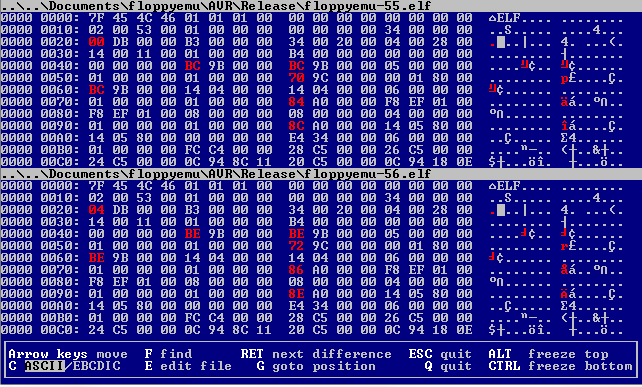
For a while I’ve been struggling with occasional mystery bugs when making changes to the Floppy Emu AVR microcontroller firmware. I’ll make some seemingly innocuous code changes, and completely unrelated things will break. Frequently I’ll change something in a menu or other user-facing code, and suddenly the Emu will lose the ability to read the SD card, and insist there’s no card present. Needless to say, this makes development a real pain in the butt.
Today I found a perfect example of this behavior, where changing the max loop count in some code that’s not even executed would cause the Emu to lose access to the SD card. Buried in the code that simulates reading a floppy disk image is this:
#define INTER_SECTOR_GAP_SIZE 55
// lots of stuff omitted
for (uint16_t i=0; i<INTER_SECTOR_GAP_SIZE; i++)
{
SendByteAndCheckRestart(0xFF);
}
What I found is that if I changed 55 to 56 or 65 or pretty much any other number, the Emu would suddenly become unable to read the SD card. What’s strange is that this for loop isn’t even executed during Emu startup, where the SD problem occurs. And just changing a single constant from 55 to 56 shouldn’t change the size or location of the compiled code, or anything else that might reveal previously hidden memory-related bugs. But it was extremely reliable: 55 always worked fine, 56 could never read the SD card.
Determined to find an explanation, I grabbed the binary diff tool VBinDiff and used it to compare the two compiled .hex files. I fully expected the files to be identical, save for a single byte that was 0×47 in one version and 0×48 in another version. But I was stunned to find the two files differ in hundreds of places! There are at least a hundred single-byte differences, as well as whole blocks that are different between the two. Thinking maybe I was getting different compile results from one compile to the next, due to a compiled-in timestamp or something weird, I tried compiling the same source code twice and comparing the results. They were identical. But if I changed the loop count, I got a hugely different result. And somehow that result was causing an SD card problem.
At the moment I don’t have any explanation for this, except maybe for some kind of compiler optimization that kicks in after 55 something-or-others. If you’re curious, you can compare the two .hex files yourself: floppyemu-55.hex, floppyemu-56.hex. The hex files show exactly what will be programmed into the ATMEGA1284′s flash memory.